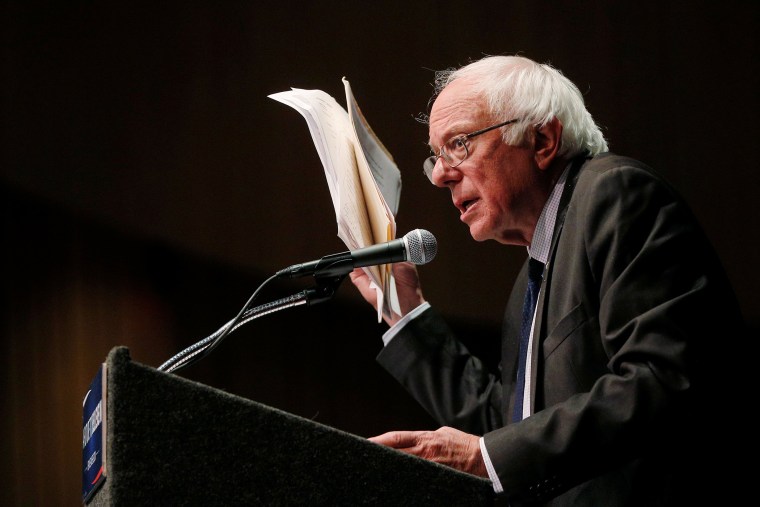Sen. Bernie Sanders (I-Vt.) has been promoting the virtues of his "Medicare for All" approach to health care reform for quite a while, but today, the Vermont senator began promoting something new: his idea in legislative form.
One of the major indicators of the changing political landscape was apparent on Wednesday, when Sen. Bernie Sanders unveiled a Medicare-for-All bill with a record 15 Democratic co-sponsors in the Senate. [...]How would it work? The government already guarantees health care to anyone over age 65 – that's Medicare. Sanders' bill proposes extending the same benefit to all Americans, regardless of age, and expanding the benefits covered by the program to include dental, vision and hearing care. It would be phased in over four years. The first year, everyone under 18 and over 55 would be covered; that would expand to everyone over 45 in the second year, everyone over 35 in the third year, and every U.S. resident in the fourth year.
The goal, according to the plan is to create expansive, universal coverage, which would effectively be free to Americans -- who would no longer be burdened by premiums, deductibles, or co-pays.
It's probably an exaggeration, though, to characterize Sanders' proposal as a complete legislative package. As the Washington Post's Paul Waldman put it, the plan is more of an "opening bid."
Overhauling the U.S. system in such a dramatic way would require some important and difficult choices, and for the most part, Sanders sidesteps those challenges. Most notably, while the Vermont independent has several ideas about possible financing options -- which is to say, figuring out how to pay for a single-payer system -- Sanders' plan doesn't actually choose from these options in his new bill. He intends to address this and related elements of his plan in a separate piece of legislation.
That makes today's unveiling somewhat incomplete, but as a practical matter, that probably doesn't much matter: with Republicans controlling Congress and the White House, it's not as if "Medicare for All" is poised for legislative consideration anyway. What Sanders apparently hopes to do is begin a conversation of sorts and help lay the political groundwork for future success. This is an aspirational approach to policymaking.
And on that front, the progressive senator appears to be on the right track. Sanders' preferred approach has never been as popular as it is now -- both among congressional Democrats and with the public -- which isn't a bad way to start a conversation.
There are obvious criticisms about Sanders' vision being ambitious to the point of being unrealistic, and as the debate continues, it's best not to just waive those critiques away. We'll need to know how much this plan will cost and how it'd be financed, and for now, the Vermonter and his allies have decided to deal with these questions another day.
I may personally be sympathetic to a single-payer model, but even I'm not sure how the senator would make the numbers add up. And before you say, "Well, the system works fairly well in Canada and throughout Europe," keep in mind that Sanders' vision includes building a system that would be even more generous to beneficiaries than our neighbors' to the north.
But what I think Sanders is doing is forcing a shift in the political winds, emphasizing progressive principles that are likely to earn public support as more Americans hear them.
The idea of Sanders' proposal gaining approval in Congress -- not this Congress, but any Congress -- may seem far-fetched, but if you'd told me a few years ago that single-payer would poll well and that a third of the Senate Democratic conference would co-sponsor a "Medicare for All" bill, I would've found it very hard to believe.
And yet, here we are.
